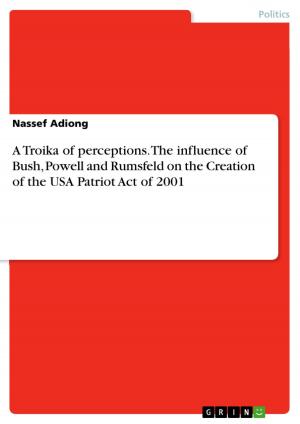US-American folk music and its political stances from the great depression to the present
Nonfiction, Entertainment, Drama, Anthologies| Author: | Cornelia Richter | ISBN: | 9783640149476 |
| Publisher: | GRIN Publishing | Publication: | August 29, 2008 |
| Imprint: | GRIN Publishing | Language: | English |
| Author: | Cornelia Richter |
| ISBN: | 9783640149476 |
| Publisher: | GRIN Publishing |
| Publication: | August 29, 2008 |
| Imprint: | GRIN Publishing |
| Language: | English |
Examination Thesis from the year 2008 in the subject American Studies - Culture and Applied Geography, grade: 1,5, Martin Luther University (Institut für Anglistik und Amerikanistik), 46 entries in the bibliography, language: English, abstract: Every country has a certain heritage of folklore. According to William John Thomas, who is supposed to have coined the term in 1846, folklore includes music as well as customs, clothing, stories, proverbs, jokes and the like. In the United States, this folklore is primarily based on what European immigrants brought to their new residence. The influence of Scottish and Irish folk, for example, is still palpable, despite the fact that folk music in America has developed an idiosyncratic sound. Tibbe and Bonson remark that the different genres of music are always connected to a specific social group and thus have a meaning that influences the perspective on society and politics significantly. The social role and category of folk music are explained as follows: Eine ... Eigenschaft der Volksmusik ist diejenige, daß sie keineswegs die Musik der gesamten Bevölkerung ist, sondern die der unteren, beherrschten Schichten. ... Auch im Hinblick auf diese Eigenschaft wird deutlich, wie sehr die Volksmusik mit der jeweiligen geschichtlichen Situation zusammenhängt: Während der relativ ruhigen Zeit des frühen Feudalismus war sie anders als zu [sic] Zeit der Bauernkriege oder gar in der Zeit des revolutionierenden Proletariats. Träger der Volksmusik sind also im Laufe der Geschichte u. a. Sklaven, Leibeigene, Bauern, Handwerker, Soldaten, Arbeiter.
Examination Thesis from the year 2008 in the subject American Studies - Culture and Applied Geography, grade: 1,5, Martin Luther University (Institut für Anglistik und Amerikanistik), 46 entries in the bibliography, language: English, abstract: Every country has a certain heritage of folklore. According to William John Thomas, who is supposed to have coined the term in 1846, folklore includes music as well as customs, clothing, stories, proverbs, jokes and the like. In the United States, this folklore is primarily based on what European immigrants brought to their new residence. The influence of Scottish and Irish folk, for example, is still palpable, despite the fact that folk music in America has developed an idiosyncratic sound. Tibbe and Bonson remark that the different genres of music are always connected to a specific social group and thus have a meaning that influences the perspective on society and politics significantly. The social role and category of folk music are explained as follows: Eine ... Eigenschaft der Volksmusik ist diejenige, daß sie keineswegs die Musik der gesamten Bevölkerung ist, sondern die der unteren, beherrschten Schichten. ... Auch im Hinblick auf diese Eigenschaft wird deutlich, wie sehr die Volksmusik mit der jeweiligen geschichtlichen Situation zusammenhängt: Während der relativ ruhigen Zeit des frühen Feudalismus war sie anders als zu [sic] Zeit der Bauernkriege oder gar in der Zeit des revolutionierenden Proletariats. Träger der Volksmusik sind also im Laufe der Geschichte u. a. Sklaven, Leibeigene, Bauern, Handwerker, Soldaten, Arbeiter.















